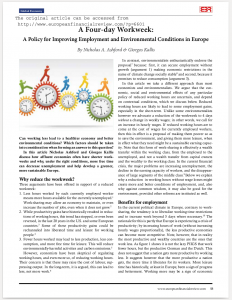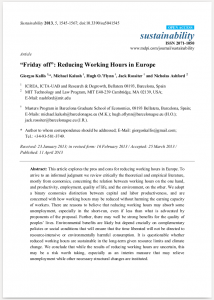A Four-day Workweek: A Policy for Improving Employment and Environmental Conditions in Europe
 Can working less lead to a healthier economy and better environmental conditions? Which factors should be taken into consideration when forming an answer to this question? In this article Nicholas Ashford and Giorgos Kallis discuss how affluent economies often have shorter work-weeks and why, under the right conditions, more free time can decrease unemployment and help develop a greener, more sustainable Europe.
Can working less lead to a healthier economy and better environmental conditions? Which factors should be taken into consideration when forming an answer to this question? In this article Nicholas Ashford and Giorgos Kallis discuss how affluent economies often have shorter work-weeks and why, under the right conditions, more free time can decrease unemployment and help develop a greener, more sustainable Europe.
“Friday off”: Reducing Working Hours in Europe
 This article explores the pros and cons for reducing working hours in Europe. To arrive to an informed judgment we review critically the theoretical and empirical literature, mostly from economics, concerning the relation between working hours on the one hand, and productivity, employment, quality of life, and the environment, on the other. We adopt a binary economics distinction between capital and labor productiveness, and are concerned with how working hours may be reduced without harming the earning capacity of workers. There are reasons to believe that reducing working hours may absorb some unemployment, especially in the short-run, even if less than what is advocated by proponents of the proposal. Further, there may well be strong benefits for the quality of peoples‘ lives. Environmental benefits are likely but depend crucially on complementary policies or social conditions that will ensure that the time liberated will not be directed to resource-intensive or environmentally harmful consumption. It is questionable whether reduced working hours are sustainable in the long-term given resource limits and climate change. We conclude that while the results of reducing working hours are uncertain, this may be a risk worth taking, especially as an interim measure that may relieve unemployment while other necessary structural changes are instituted.
This article explores the pros and cons for reducing working hours in Europe. To arrive to an informed judgment we review critically the theoretical and empirical literature, mostly from economics, concerning the relation between working hours on the one hand, and productivity, employment, quality of life, and the environment, on the other. We adopt a binary economics distinction between capital and labor productiveness, and are concerned with how working hours may be reduced without harming the earning capacity of workers. There are reasons to believe that reducing working hours may absorb some unemployment, especially in the short-run, even if less than what is advocated by proponents of the proposal. Further, there may well be strong benefits for the quality of peoples‘ lives. Environmental benefits are likely but depend crucially on complementary policies or social conditions that will ensure that the time liberated will not be directed to resource-intensive or environmentally harmful consumption. It is questionable whether reduced working hours are sustainable in the long-term given resource limits and climate change. We conclude that while the results of reducing working hours are uncertain, this may be a risk worth taking, especially as an interim measure that may relieve unemployment while other necessary structural changes are instituted.

